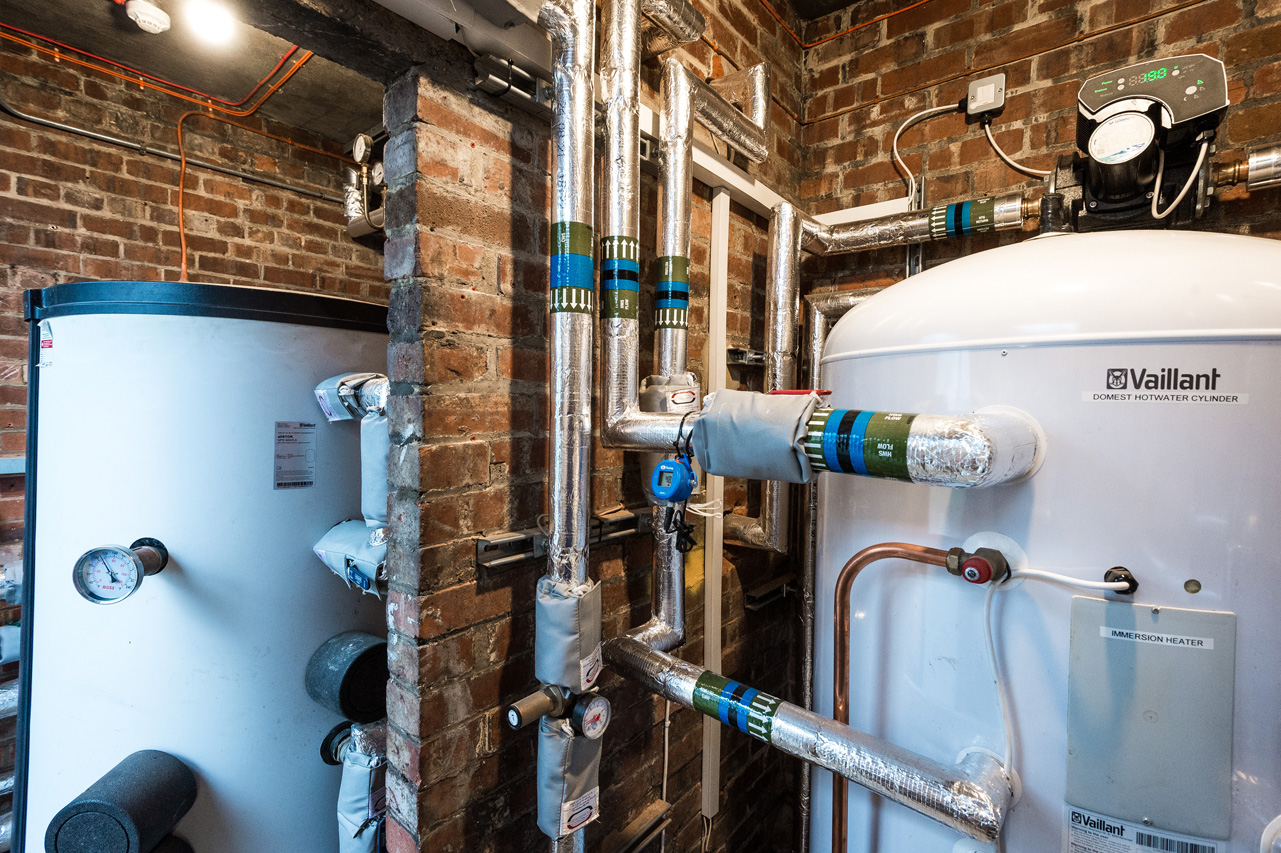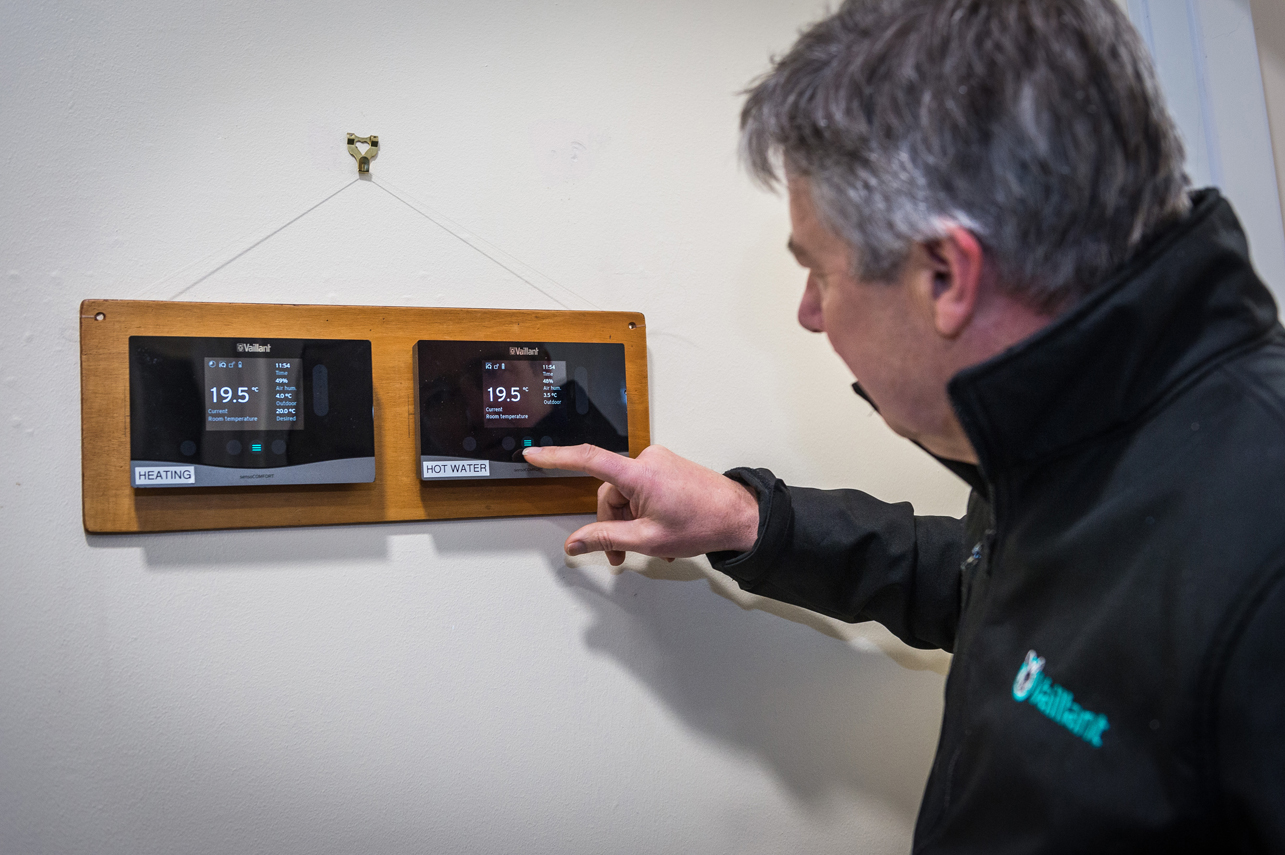LABM finds out how the installation of heat pumps from Vaillant have helped Woodland Primary School become the lowest carbon emitting school in County Durham.
Since the 1980s, Woodland Primary School in Bishop Auckland, County Durham had relied on oil to provide its heating and hot water needs. However, when the school’s oil heating system came to the end of its life, a more sustainable option was needed. With funding secured for the project from the Public Sector Decarbonisation Scheme via the Department of Business, Energy and Industrial Strategy (now the Department for Energy Security & Net-Zero), Durham County Council called on the expertise of Vaillant to specify a low carbon heating system that would reduce running costs and improve overall efficiency.
Based in a remote part of Durham, Woodland Primary School is a small school, with a capacity of just 42 pupils, that up until recently relied on a 68kW oil boiler for its heating and hot water capabilities. The boiler had come to the end of its useful life, and was starting to breakdown more frequently, shutting the school on several occasions.
The school was originally built in 1968, yet over the years the fabric of the building had been improved with double-glazing and cavity wall insulation. In addition, its network of underground hot water pipes had recently been decommissioned and upgraded to wall-mounted pipes, which provided an ideal base to install a new, low carbon heating system. In this case, four Vaillant aroTHERM plus air source heat pumps were specified to transition the school from oil to a more sustainable heating solution.
Pre-sales support
Malcolm Johnson, Energy Conservation Adviser at Durham County Council, said: “We established early in the project that the oil boiler at Woodland Primary School would be replaced with a heat pump solution. However, with the tight time constraints and additional challenges with the fabric of the building itself, we needed to call on outside expertise to calculate the size and volume requirements — as well as which type of heat pump would be most suitable.”
As a result, the Council approached Energist Solutions, who recommended Vaillant having previously worked with their team of experts. Dean Southern, Commercial Development Director at Energist Solutions said: “Woodland School is located in a rural area where winters can be very cold. It was important that we specified a heat pump system that would be able to meet the school’s heating and hot water demands, even when the outside temperature was very low. The aroTHERM plus was ideal for meeting these needs, and we knew that by working with Vaillant we would be supported with technical support and robust warranties.”
Vaillant’s end-to-end expertise and support team is available to specifiers across every aspect of heating design, under The Vaillant Standard. This includes pre-planning, system design, consultancy services and aftersales support.

Securing the right funding
In 2021, the UK government allocated an additional £3.9bn of new funding to support the decarbonisation of heat. This included an allocation of £1.425bn to the Public Sector Decarbonisation Scheme (PSDS), which would provide grants for local authorities and other public bodies to use to decarbonise heat in public sector buildings and install energy efficiency measures.
As a local authority responsible for numerous public buildings off the mains gas grid, Durham County Council had already identified — through its Climate Emergency Response Plan — to replace oil boilers with low carbon alternatives as a key action. Supported by an enthusiastic school Office Manager and Head Teacher, the Low Carbon Team at Durham County Council applied to the PSDS through Salix Finance to cover the cost of the project.
The team successfully secured £113,000 of the total £122,000 project cost to upgrade Woodland Primary School, which included the design and installation of the aroTHERM plus heat pump cascade system, 31 ground-mounted solar panels and converting all lighting in the school to Light Emitting Diodes (LEDs).
Woodland Primary School is the first school in the region to benefit from the PSDS funding, with the remaining £9,000 funded from the Council’s own ‘Invest to Save’ budget.
The perfect balance
The school’s existing oil boiler was replaced with four Vaillant aroTHERM plus heat pumps, located where the oil storage tank used to be, away from the main school building. It was deemed that two 12kW units would provide the heating requirements, with an additional two 10KW units being able to alternate between heating and hot water demand.
Air source heat pumps are most efficient when operating at low temperatures, so system balancing is crucial to ensuring they run at optimal efficiency. By carrying out heat loss calculations in the building, Vaillant determined that new radiators with a larger surface area would be required to ensure the heat was distributed evenly, and these would be fitted during the school summer holidays to avoid any interruption to the children’s learning.
The aroTHERM plus uses a natural refrigerant — R290 — which gives a global warming potential of just 3 and an ErP rating of A+++. The use of R290 also means the school can achieve greater comfort levels and allows domestic hot water to be stored at a useable temperature so that legionella cycles can take place without the need for a backup heater. The heat pumps were installed alongside a large buffer tank and large hot water tank, both of which were in the original boiler house.

Continuous supply
The rural primary school initially wanted the new heating system to be integrated with the existing Building Management System (BMS). Working with Vaillant and their design team, Energist were able to adapt the legacy BMS system to work with the Vaillant 720 sensoCOMFORT control, to monitor the energy usage for the school whilst ensuring a continuous supply of power via the adaption to a three-phase supply.
By installing the sensoCOMFORT control, the heat demand is continuously monitored and the aroTHERM plus units can switch on automatically as required.
New, ground-mounted solar PV panels were also installed at the rear of Woodland Primary School’s playing fields. There are 31 panels in total, with each panel delivering 455W, resulting in a peak power of 14.1KW. The heat pump units will all be in operation during the winter months, however only one will be required in warmer weather. Utilising solar panels has also helped to reduce the amount of electricity the heat pumps consume from the grid.
The solar panels provide the school with a way to generate their own electricity that can be used for their own purpose, as well as a means to generate revenue. The surplus electricity generated by the solar panels is captured through an energy-harvesting device and used to pre-heat the hot water tank. Any further surplus is sold back to the grid, helping to generate additional funds for the school.
From a budgeting perspective, generating energy independently from the grid means the school can better manage its overheads at a time when energy prices are fluctuating more than ever before.
Leading the way
Malcolm Johnson said: “The Woodland Primary School project has achieved several ‘firsts’ in County Durham. It is the first school to get air source heat pumps, first to get ground-mounted solar panels, and the first to benefit from grant funding under the Public Sector Decarbonisation Scheme.
“We embraced the challenges of this project, and the expertise from Vaillant was vital in delivering the heat pump solution. We have been really impressed with the aroTHERM plus heat pumps, and the high level of service we received from Vaillant’s expert team, including their support in the pre-planning, help with designing the plans and consultancy when we ran into any issues.”
Steve Cipriano, Commercial Director at Vaillant commented: “Ground source heat pumps were initially considered for Woodland Primary School, however, through our consultation it was advised that because of the preparatory works that would be needed prior to the installation, it would be impossible to achieve this within the project timescales.
“It was also crucial for the school that they avoided closures and further disruptions to the pupils, whilst still significantly reducing their carbon emissions. An additional benefit of installing air source heat pumps is that we could be confident in assuring the customer that this technology could be installed in time for heating season, whereas ground source heat pumps often take much longer. Air source would also offer better access for installers should any issues arise.”
Woodland Primary School is now the lowest carbon emitting school in County Durham, reducing its carbon emissions from 22.1 tonnes per annum to 4.9 tonnes. This figure is expected to reduce even further as the electricity grid is decarbonised.
These successes have also allowed Durham County Council to scope out more carbon reduction projects in the region, based on the tangible results of Woodland Primary School.
Header image: The school’s existing oil boiler was replaced with four Vaillant aroTHERM plus heat pumps.










